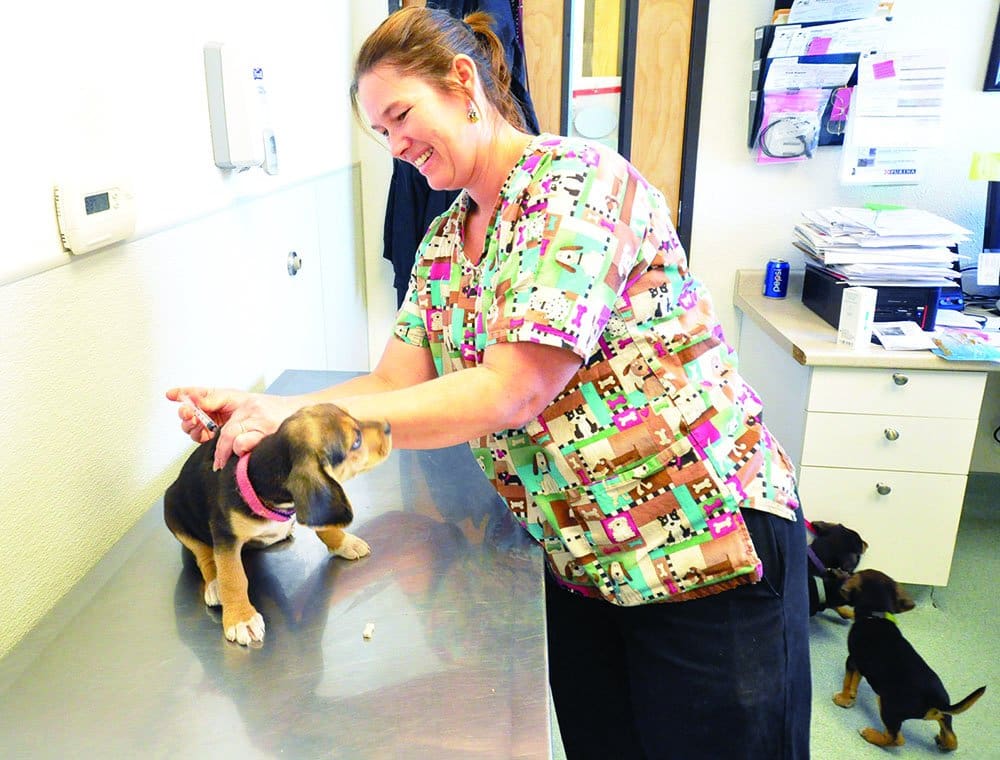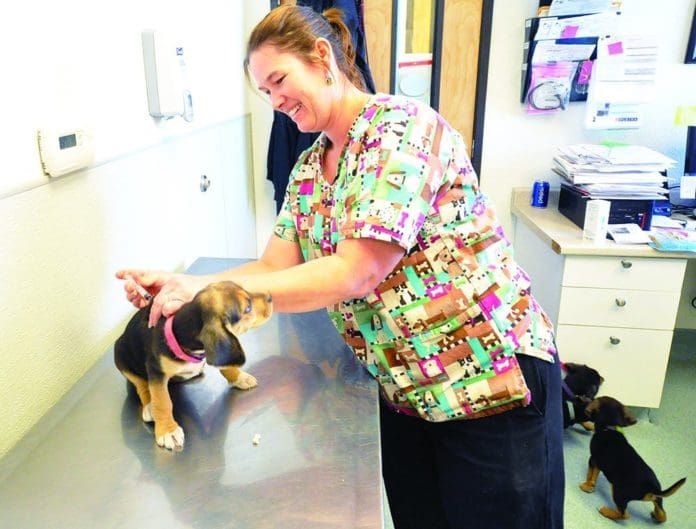You might be surprised to know that dogs don’t actually need a “series” of shots in order to be immunized against canine diseases. That said, paradoxically, there is a good and compelling reason to follow your veterinarian’s directions for the commonly administered “puppy series” of shots. Here’s why:
Puppies are born with immune systems that are not fully functional. In their first weeks, they are protected from disease by antibodies they received from their mothers’ blood in utero and (even more important) antibodies they received from the colostrum they drank when they first started to nurse. Present in the first 36-48 hours of milk flow following birth, colostrum is a highly concentrated mixture of antibody molecules, vitamins, electrolytes, and nutrients. After about 48 hours, the colostrum is all gone and the mother’s body makes only milk, without any more agents of immunity. Orphan puppies who don’t get to nurse for the first two days of their lives miss out on this vitally important colostrum and are at great risk of becoming ill before their own immune systems and vaccines can take hold.

The strength of the protection a puppy gets from his mother is dependent on her own immune status. The higher her antibody levels, the stronger the protection she passes on to her pups. This sounds great, and it is, up to a point.
When we vaccinate puppies, we give them doses of disease agents (antigens) that are either killed, weakened, or modifed in such a way that they can no longer cause disease. If strong maternal antibodies are still circulating in the pup’s body at the time he is vaccinated, those antibodies can recognize and destroy the antigens in the vaccine before the puppy’s immune system can learn to recognize them and form its own protective antibodies. In other words, like an overprotective mom, the maternal antibodies will “fight” the vaccine and render it useless.
Fortunately, the mother’s maternal antibodies last only so long. At some point, usually when the puppy is between 6 and 18 weeks old, the agents of the mother’s immunity fade away. Ideally, we would vaccinate the puppy just once, when he was old enough to develop his own agents of immunity, and his mother’s immunity had faded enough to allow his own immune system to respond to the vaccine.
The problem is, the age at which this happens varies a lot. And there is a period when the agents of the mother’s immunity are no longer protecting the puppy from disease, but still too high to allow the vaccine to work. This period is called the window of susceptibility, during which time a puppy could contract a disease. We vaccinate puppies several times in an effort to shorten that window, hoping to vaccinate and protect the puppy as soon his immune system can respond appropriately to the disease antigen. We cover our bet on this timing, so to speak, by vaccinating the puppy several times – and by keeping the puppy away from places that might be frequented by sick dogs.
The age at which puppies are able to respond to a vaccine and develop protection (become immunized) covers a wide period of time. Studies have shown that at 6 weeks of age, about 25 percent of the puppies are protected by the vaccines they received. At 9 weeks, 40 percent of the puppies were able to respond to the vaccine and are protected. The number increased to 60 percent by 16 weeks, and by 18 weeks, 95 percent of puppies are successfully immunized. (For more about the final 5 percent, see “Vaccine Titer Tests”, in the June 2014 issue of WDJ.)
So, yes, you need to protect your puppy until he has completed his “puppy series” of shots – but that doesn’t mean keeping him in bubble wrap. You also need to socialize him well, taking responsible precautions to keep him safe. I would be willing to bet that far more dogs die in animal shelters due to lack of early socialization and training than puppies who die as a result of disease exposure by conscientious owners doing appropriate puppy socialization.






